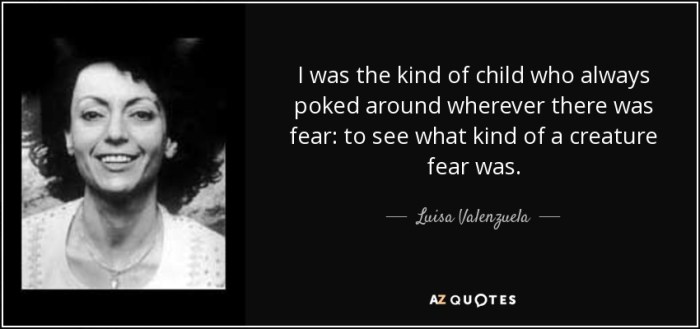Archetypes in things fall apart – In Chinua Achebe’s masterpiece, Things Fall Apart, archetypes take center stage, offering a captivating lens through which to explore the complexities of human nature and the enduring themes that transcend time and culture. As we delve into the novel’s rich tapestry, we will uncover the profound significance of these archetypal characters, their impact on the narrative, and their enduring relevance to our own lives.
From the heroic journey to the enigmatic shadow, archetypes serve as building blocks of literature, shaping our understanding of ourselves and the world around us. Things Fall Apart provides a fertile ground for examining these archetypal patterns, revealing their power to illuminate the human condition and connect us to a shared collective consciousness.
Identify and Explain Archetypes: Archetypes In Things Fall Apart
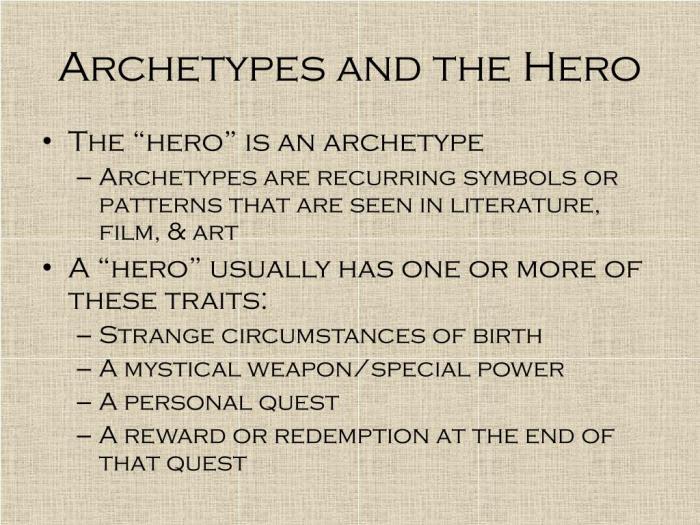
Archetypes are universal, recurring patterns or characters that appear across different cultures and stories. They represent fundamental human experiences, emotions, and motivations.
Archetypes play a crucial role in literature and storytelling by:
- Providing a shorthand for complex ideas:Archetypes allow writers to evoke powerful emotions and themes without explicitly stating them.
- Creating relatable characters:Archetypes help readers identify with characters and their struggles, making stories more immersive and meaningful.
- Shaping narrative structure:Archetypes often follow predictable patterns, which can provide a framework for storytelling.
Common Archetypes
Some common archetypes include:
- The Hero:A courageous and determined character who overcomes obstacles to achieve their goals.
- The Mentor:A wise and experienced figure who guides the hero on their journey.
- The Shadow:A dark and threatening figure that represents the hero’s inner struggles.
- The Damsel in Distress:A helpless and vulnerable character who needs to be rescued.
li> The Trickster:A cunning and mischievous character who uses deception to achieve their ends.
Explore Major Archetypes in “Things Fall Apart”
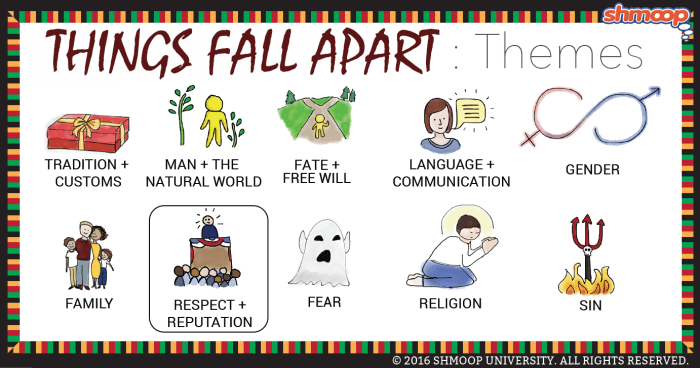
In Chinua Achebe’s seminal novel, “Things Fall Apart,” archetypes play a pivotal role in shaping the narrative and exploring universal human experiences. These archetypal characters embody fundamental human traits and emotions, allowing readers to connect with the novel’s themes on a deeply personal level.
The Hero
Okonkwo, the protagonist of the novel, embodies the archetypal hero. He is a strong, courageous, and proud warrior who adheres to the traditional values of his Igbo community. Okonkwo’s struggle against the encroaching influence of European colonialism represents the universal human conflict between tradition and modernity.
The Trickster
Ezeudu, Okonkwo’s father, serves as the archetypal trickster. He is a cunning and enigmatic character who often uses humor and deception to achieve his goals. Ezeudu’s behavior reflects the ambivalent nature of human morality and the complex ways in which people can manipulate others.
The archetypes in Things Fall Apart, such as the wise elder and the tragic hero, provide insights into the human condition. While these archetypes are timeless, their interpretation can vary depending on the context. For instance, the big ideas geometry answer key offers a unique perspective on the archetype of the wise elder, highlighting the importance of logical reasoning and mathematical precision.
The Wise Old Man
The Oracle of the Hills and Caves represents the archetypal wise old man. He possesses a deep understanding of the world and its mysteries, and he provides guidance and wisdom to those who seek it. The Oracle’s presence highlights the importance of tradition, knowledge, and the search for truth.
The Scapegoat
Ikemefuna, a young boy from a neighboring village, becomes the archetypal scapegoat. He is sent to live with Okonkwo as a hostage to ensure peace between their communities. Ikemefuna’s tragic death serves as a catalyst for Okonkwo’s downfall and reflects the destructive consequences of blind adherence to tradition.
The Villain
Mr. Smith, the European missionary, represents the archetypal villain. He is a symbol of the colonizing forces that disrupt the Igbo community and undermine their traditional way of life. Mr. Smith’s actions highlight the dangers of cultural imperialism and the destructive impact it can have on indigenous cultures.
Analyze the Hero’s Journey Archetype
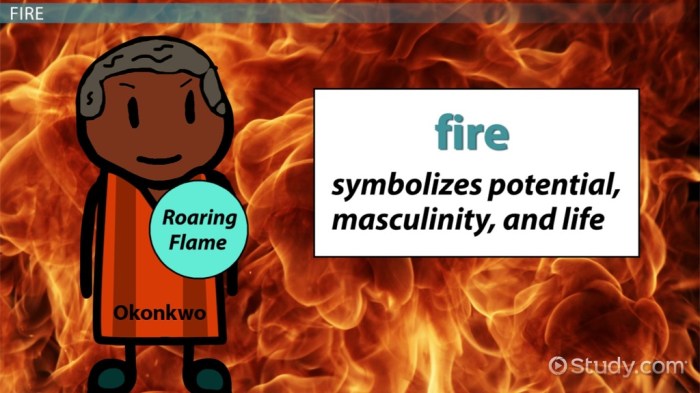
The hero’s journey archetype is a common narrative pattern that depicts the transformation of an ordinary individual into an extraordinary hero. This archetype is prevalent in “Things Fall Apart,” as several characters embark on journeys that follow this pattern.
Okonkwo’s Hero’s Journey
Okonkwo, the protagonist of the novel, is a quintessential example of the hero’s journey archetype. He begins as a respected and successful warrior in his village. However, his world is turned upside down when the white colonizers arrive and disrupt his community.Okonkwo’s
journey begins with a call to adventure when he is summoned to fight the white men. He initially resists this call but eventually accepts his destiny. As he faces the colonizers, Okonkwo experiences a series of trials and tribulations that test his courage and resolve.Despite
his bravery and determination, Okonkwo ultimately fails in his quest to protect his village. He is defeated by the colonizers and commits suicide, becoming a tragic hero in the end. However, his journey serves as a testament to the indomitable spirit of the Igbo people and their resistance against oppression.
Examine the Shadow Archetype
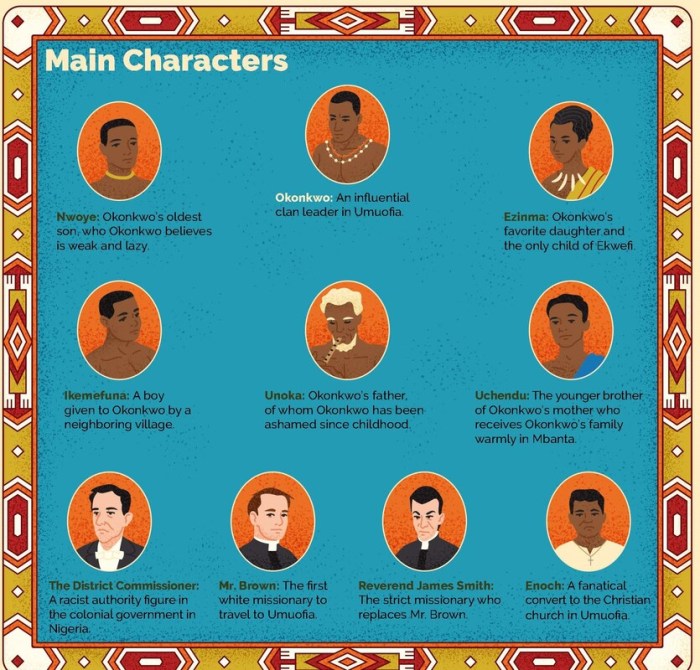
The shadow archetype represents the dark side of human nature, embodying repressed thoughts, impulses, and fears. In “Things Fall Apart,” several characters embody this archetype, revealing the complexities of morality and the struggle between good and evil.
Ezeudu
- Ezeudu, Okonkwo’s father, exemplifies the destructive aspects of the shadow. His violent temper, excessive drinking, and disregard for the community’s traditions foreshadow Okonkwo’s own tragic downfall.
- Ezeudu’s shadow qualities serve as a warning about the dangers of unchecked anger and the corrosive effects of societal pressures on the individual.
Nwoye
- Nwoye, Okonkwo’s son, represents the rebellious and nonconformist aspects of the shadow. His rejection of his father’s rigid masculinity and his affinity for the white man’s religion symbolize the inner conflict between tradition and modernity.
- Nwoye’s shadow qualities highlight the tension between personal beliefs and societal expectations, exploring the struggle to find one’s true identity amidst conflicting influences.
Mr. Smith
- Mr. Smith, the white missionary, represents the shadow of Western colonialism. His condescending attitude, cultural insensitivity, and desire to convert the Igbo people to Christianity reflect the destructive potential of cultural imperialism.
- Mr. Smith’s shadow qualities expose the hypocrisy and violence inherent in the process of colonization, challenging the simplistic notions of good and evil that often accompany religious and cultural conflicts.
Analyze the Mentor Archetype
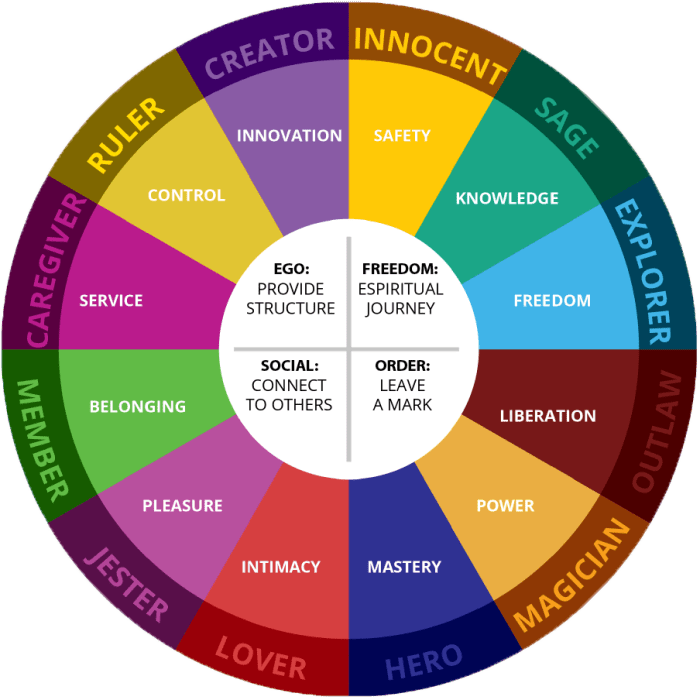
The mentor archetype represents figures who guide and support the protagonist on their journey. They provide wisdom, guidance, and protection, helping shape the protagonist’s path and understanding.
Okonkwo and Nwoye
In “Things Fall Apart,” Okonkwo serves as a mentor to his son, Nwoye. Despite their strained relationship, Okonkwo imparts his values, beliefs, and knowledge of Igbo traditions to Nwoye. Through his teachings, Okonkwo attempts to mold Nwoye into a strong and respected member of the community.
Significance of the Mentor Archetype
The mentor archetype is crucial in shaping the protagonist’s journey. Mentors provide guidance and support, helping the protagonist navigate challenges and make informed decisions. They also offer a sense of continuity and tradition, connecting the protagonist to their past and future.
Compare and Contrast Archetypes
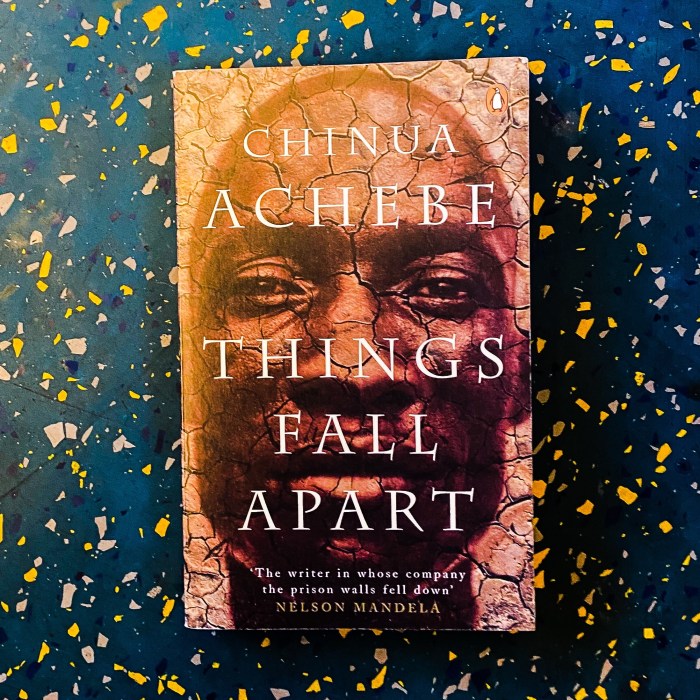
In “Things Fall Apart,” Achebe skillfully employs a diverse range of archetypes, each embodying universal human experiences and traits. These archetypes interact and complement each other, creating a complex and nuanced narrative that resonates deeply with readers.
Hero Archetype
Okonkwo, the protagonist, embodies the classic hero archetype. He is a brave, strong, and respected warrior who faces adversity with determination and courage. His journey reflects the challenges and triumphs of individuals seeking to establish their place in the world.
Shadow Archetype
In contrast to Okonkwo, Ezeudu represents the shadow archetype. He is Okonkwo’s father, who is weak, timid, and despised by the community. Ezeudu’s presence highlights the darker aspects of human nature, such as fear, insecurity, and failure.
Mentor Archetype
The character of Obierika serves as the mentor archetype. He is Okonkwo’s friend and confidant who provides guidance and wisdom throughout the novel. Obierika’s insights and observations help Okonkwo navigate the complexities of his world.
Trickster Archetype, Archetypes in things fall apart
The trickster archetype is embodied by Chielo, the village oracle. She is a cunning and enigmatic figure who manipulates events to her advantage. Chielo’s actions reveal the unpredictable and chaotic nature of life.
Scapegoat Archetype
Ikemefuna, the young boy adopted by Okonkwo, becomes the scapegoat archetype. His innocent death serves as a catalyst for the downfall of the Igbo community, highlighting the destructive consequences of fear and superstition.
Interplay of Archetypes
The interaction of these archetypes creates a rich tapestry of human experience. Okonkwo’s heroic journey is challenged by Ezeudu’s shadow, guided by Obierika’s mentorship, and ultimately betrayed by Chielo’s trickery. The sacrifice of Ikemefuna as a scapegoat reveals the devastating impact of irrational beliefs.
Answers to Common Questions
What is an archetype?
An archetype is a recurring pattern or character type that appears across cultures and time periods. Archetypes embody universal human experiences, emotions, and motivations.
How do archetypes shape the characters in Things Fall Apart?
Archetypes provide a framework for understanding the characters’ motivations, conflicts, and development. They connect the characters to a larger collective consciousness, making them relatable to readers from diverse backgrounds.
What is the significance of the hero’s journey archetype in Things Fall Apart?
The hero’s journey archetype represents the protagonist’s journey of transformation and self-discovery. It provides a roadmap for the character’s growth and the obstacles they must overcome.

